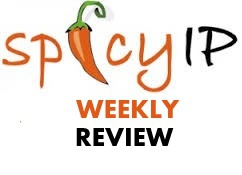Highlight of the Week
 Over the last week, the post Swaraj and I did on Lee Pharma’s compulsory licence application for AstraZeneca’s anti-diabetic Saxagliptin has been generating a lot of buzz. We broke the story first following an anonymous tip-off on the blog, and questioned the application’s merits on the ground that Saxagliptin was just one of four DPP-4 inhibitor drugs used for Type II Diabetes Mellitus management, and seemed to be substitutable for the other three. This significantly lowers the chance of the application succeeding, since the other drugs (such as Sitagliptin and Vildagliptin) have been sold at competitive prices by local generic manufacturers.
Over the last week, the post Swaraj and I did on Lee Pharma’s compulsory licence application for AstraZeneca’s anti-diabetic Saxagliptin has been generating a lot of buzz. We broke the story first following an anonymous tip-off on the blog, and questioned the application’s merits on the ground that Saxagliptin was just one of four DPP-4 inhibitor drugs used for Type II Diabetes Mellitus management, and seemed to be substitutable for the other three. This significantly lowers the chance of the application succeeding, since the other drugs (such as Sitagliptin and Vildagliptin) have been sold at competitive prices by local generic manufacturers.
We then had the second of Thomas’ two-part post analysing the ruling in IPRS v. Sanjay Dalia, in which he continued on his examination of the jurisdiction question. In a nutshell, the question before the SC was whether a plaintiff can sue for copyright or trademark infringement in a particular place despite the existence of another jurisdiction where the plaintiff has an office and where a part or the whole of the cause of action arose. Thomas goes on to look at the implications of the decision – the most significant of which is that plaintiffs can no longer continue the practice of suing in Delhi in cases where the infringement has occurred in another city where they have an office.
Aparajita then brought us a guest post from Ritvik Kulkarni dealing with a writ petition filed by the Delhi Network of Positive People in the Delhi High Court. The writ petition sought directions from the court to the Ministry of Industry and Commerce to amend the patent framework to prevent the filing of abusive divisional applications. Ritvik pointed out that such applications lead to uncertainties for generic manufacturers, especially of ARV drugs for HIV patients, but also noted that the court had dismissed the petition on procedural grounds. Since the scope of judicial review could not be extended to legislate or give directions to legislate in a particular manner, the court instead directed the Ministry to consider the grievances of the petitioner and take an informed decision.
Kartik then came up with a powerful post on how intermediary liability would play out in transactions of physical goods by e-tailers, wondering whether the traditional safe harbour provisions in the Copyright Act and the IT Act were limited to transactions involving digital goods. He argued that despite the inapplicability of these provisions, there exists a different route to protect intermediaries involved in sales of physical goods – through S. 63 of the Copyright Act.
Matthews did a post analysing the Madras HC’s refusal to grant an interim injunction to Wipro Enterprises against Heinz India over the latter’s trading in glucose-based chewy tablets called Volts, which the plaintiff alleged to be infringing of its own product sold under the mark Bolts. The court held that since the plaintiff only adopted the mark in 2012, it cannot be said to have acquired secondary meaning. Further, visual similarities between the marks were held not to be present on a preliminary analysis, and the plaintiff’s use of the words “anytime, anywhere” in its tagline were also held not to be worthy of protection at the interim stage.
Finally, Spadika informed our readers about SpicyIP’s collaboration with LawStreetIndia, meaning that we will now feature LSI’s latest IP headlines on our page, while LSI will feature select SpicyIP stories on its IP Corner.
International Developments
- The 30th session of the WIPO Committee on Copyright and Related Rights (SCCR30) took place from 29 June to 3 July. As IPWatch reports, the Committee was unable to build consensus on issues such as the protection of content creators from piracy and the creation of exceptions for libraries, archives, education and research.
- Japan seems to be intent on abolishing copyright extensions arising out of WWII as part of negotiations over the Trans-Pacific Partnership with the US, according to the The Japan Times.
- A Belgian court has acquitted the founders of The Pirate Bay on charges of copyright infringement and electronic communications abuse.
- A district judge has affirmed a 2014 ruling by the Trademark Trial and Appeal Board, declaring that the Washington Redskins’ franchise name “may disparage” people and is therefore ineligible for trademark protection.
- A federal judge has ordered a retrial to determine damages in a suit brought against Apple by a Texas-based NPE called Smartflash. This comes after a Texas jury ordered Apple to pay $532.9 million in damages earlier this year.
